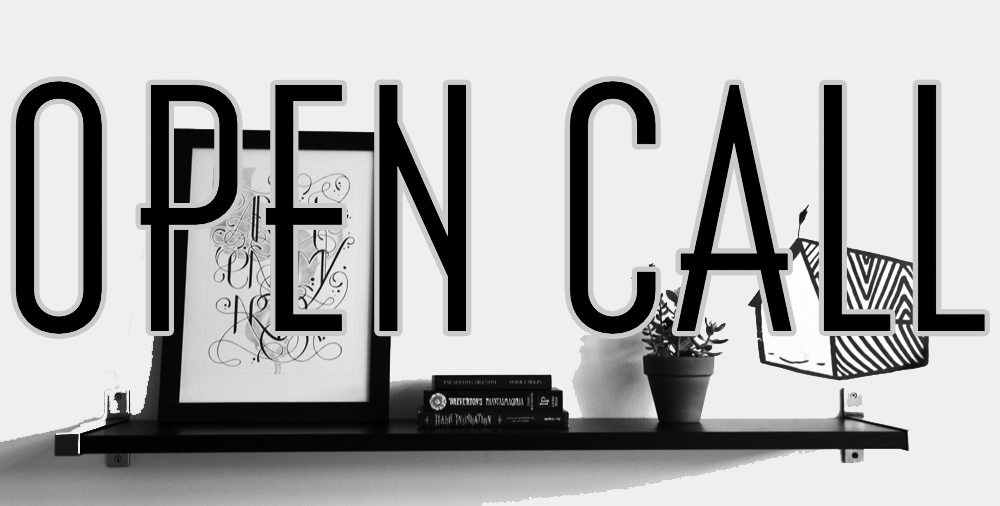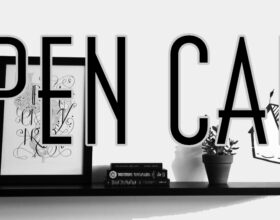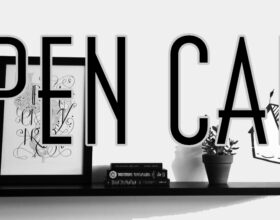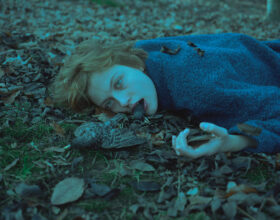Welcome to the 17th edition of Open Call. Today we’re talking about mental barriers, weird art, and copyrights.
Email us at opencall@beautifulbizarre.net with any questions you have, concerns, success stories, challenges, or any other topic you’d like to discuss with a Gallery Director. Every other Monday we’ll publish a few of our favorites along with my replies. If you don’t see your email published, it does not necessarily mean it won’t be saved for a future installment. There have already been way too many good questions to make it into just one edition. Visit my online author profile and stay updated on past editions.
**Some emails have been edited for length
This is a little different but I wanted to start this week’s Open Call off with a conversation I had recently, which is relevant to artists and people in general.
Last week I was at a drink and draw thing that several local artists organize here in Philly and there was a really good conversation between myself, an artist named Steve, and our friend Sarah who is a great curator and also works here in the city. What we were talking about I think is worth sharing, and funny enough, Steve had actually said at one point that he felt like he was living inside an episode of this column, so I asked for his permission to share a little bit of that talk today.
Some background. Steve is an artist. He wants to see more success as an artist. He’s been very successful in other things in his life, professionally, but when it comes to art, he’s frustrated.
When Sarah and I pressed him on why he was so frustrated he said a few things that he believes to be true, and that really stuck out to me. The first was that he believes there are fewer opportunities for artists today than ever before. The second is that he believes artists are paid less than ever before, making it more difficult to earn a living as an artist. The third, and to me most interesting, was that in every single other career he’s had, the path to success has been clear. Only in art is that path unclear to him and his takeaway from that is – understandably – that achieving success in this career path is the most difficult of anything he’s done before, and least likely.
See, I don’t believe that any of these things are true. Maybe it’s because I’m right in the thick of it, but I see more opportunities for artists, not just opportunities, but opportunities to make a living more so than ever before. This is a VERY exciting time to do this type of work and more people have the opportunity to do it. That goes for someone like me too. I don’t know how many full-time gallery or art directors there were 30 years ago but I’d bet there are a lot more today. I guarantee there are more than there were 100 years ago. There are more galleries, more serious and casual collectors, as well as additional opportunities for commercial and design work. More advertising. More book covers. More posters that need to be designed. I’m not suggesting that you have to do all these things, you don’t have to do any of them as far as I’m concerned, but just because it’s not the way you want your art to earn you a living does not mean the options don’t exist.
As far as income, I don’t believe there is less money. I actually think there is way more money being invested into art and the whole economy around it. I think there is just more competition and maybe what’s most different is that an artist needs to be more proactive and learn to be good at some other business skills and branding and things like that. Skills beyond just making good art that you need to have and should understand and think about in order to stay competitive. Negotiation skills are super important when trying to get the best rates for commissions so courses on negotiation might help artists get better rates for their work. You don’t have to do it all on your own. There are great partners out there who can help move you forward. If you work with expert negotiation teachers they can help you build up the skills you need to build a full-time income from your art. I made a claim in this part of the conversation that might sound ridiculous. I said that if I made a list of artists I know today are working full-time and fully supporting themselves, their families, etc. and then made another list of artists who I could just name from any time in history before I was alive, the first list would be longer. I meant it, and in hindsight, I stand behind it. That dumb thing that your friends and family rag on you about… where they tease you about how as an artist maybe you’ll finally make some money after your dead did not come from the landscape being difficult in 2016. You have real opportunity. You also have a more connected community of artists and other people who believe in the value of your work more than ever before. We just had a thing happen here in Philly where a restaurant requested artists make work for their book project for exposure and gift cards. The community shut them down. It was brutal. This is a new and positive thing!
On this being the most difficult path. I can’t say it is or is not. But the best advice I could give him was to ask himself why he believed that, and why it’s so different. I think exploring that question is the best thing he can do, because he’s inside his own head. It’s not just Steve, and it’s not just artists, but almost everyone creates these sort of mental barriers for themselves. I do it all the time to myself. But it’s so important to check yourself every once in a while, to change your perspective, and to make sure you not only believe that your hard work will bring success, but believe that succeeding is possible and that you deserve the results. There’s so much shit that you can’t control, and art is hard. But almost everything is hard. If at the end you still truly believe you’ve chosen the most difficult, messed up, undervalued profession on the planet then my advice is to take a step back and maybe just make art for yourself for a while without that kind of pressure.
But if you intend to do this, and to really do this, the very least you can do is believe that it’s possible. That’s not to say that any of this is easy. But if you can’t see yourself doing it for real, then I’d say that’s the first thing you need to change.
Patrick,
I sometimes get asked by authors to use one of my photos for their book cover and if my photos have a copyright. So how do I get an image copyright protected, how much is it to do that, and how much should you charge someone to do a book cover?
Jason
Hey Jason,
Technically, you already own a copyright on the photos you have taken from the moment you take them, unless you’re freelancing or working for someone else while you take them. However, even in those cases the details should be addressed in your agreement so there is no controversy over works you made for hire. Stuff like this is important in protecting both sides so make sure any contracts and agreements address these things up front, otherwise for one party or the other, copyright infringement could be creative damages you can sue for.
I’ll make a confession. When someone asks a question like, “is this copyrighted?” for me that’s a little bit of a red flag. When I hear this, the real question I hear in my head is, “Do I have to pay you for this?”. I am not saying that to be discouraging or to suggest that you feel instantly cynical or disappointed if a conversation starts out this way. When I say it’s a ‘red flag’ I always mean that much more as a ‘be careful’ and not a ‘run away’. It’s probably worth mentioning that it’s literally my job to protect the rights and value of artists and their work. Just think of it like how a manager treats and looks after their employees; this is what I’m doing but with a group of artists instead. At the end of the day, they’ve created these pieces of art so it is important that they get the credit they deserve. Looking at these types of conversations and negotiations critically is part of the package, and it’s also worth mentioning that I’ve participated in many conversations that have started out this way just because of a lack of education on the process, or clunky communication skills, and not something sinister or malicious.
Things like this have a couple levels though, so if and when there is a problem, it’s not always just about copyright ownership, it’s also about copyright enforcement. If you have a specific photo or photos that you know are going to be used commercially you may want to consider registering your copyright with the US Copyright office, and that application costs $55. Note that you aren’t buying a copyright here. You are registering the one you already own as the creator of the image. There are at least two benefits to doing this. One is that in the case of a bad scene, you would have the benefit of having the Copyright office involved in the defense of your copyright, and second having the registration can affect the amount of compensation or damages you can receive in the end.
As for setting your rate there really isn’t one cost of a book cover. Always agree to something you’re comfortable with and you feel fairly compensates you for your time, work, and ideas. When you’re starting out though, understand that it’s like payment for any job in the beginning. Never sell yourself short, but also don’t forget to be realistic and understand that what someone might charge in the middle of their career licensing photos to books and popular publications and what may be reasonable for your first project are two very different numbers. So consider your time. Consider the use too, and find out if they’re asking for an exclusive license to the image or just licensing for use. If it’s the latter it should be a lesser rate since you retain the option of licensing the image out for additional and even similar purposes, and that it was used for a cover doesn’t take any of those options off the table. As you have more success and the value of your time increases, you will raise your rates accordingly and make more money.
I would also strongly suggest anyone who’s working or trying to work commercially take the time to educate themselves on copyright laws, and your rights.
Good luck!
-patrick
Patrick,
(re: the last edition of Open Call) Topic of cunning intrigue indeed. I’m a poet. Rhyme intended because they just happen. First, no such thing as “bad art”. If someone poured their soul into creating anything. It is art. Period. To whom it aesthetically appeals becomes the fodder for interpretive thought. Not all of it speaks to me but I see beauty – something in most. Depends on medium used. Hence weirdo ideas. An artist in search to discover or uncover what becomes his or her vice from time to time flops. It’s a transition. Sometimes painstaking process. Requires being brutally honest and critical of one’s own ability. Coming through that without disrupting the flow. Continuing to make art regardless of perceived quality or value measure. That’s the difference between an artist who becomes self sustaining and one who resigns themselves to a hobby, while moonlighting as a corporate kiss ass. Question to featured gallery expert. What do you, then, consider art gone weird. As in out there where it makes sense to no one but its creator
-R.A.W.
Hey there,
Not to be contrarian but I don’t think it’s possible to have art that doesn’t make sense to anyone but its own creator. What it means to you may be different from what the creator intended, but I think that’s a different thing. It would be an impressive feat to do that, now that I’m thinking about it. To create a piece that cannot even attempt to be explained by anyone other than the artist. Someone should do this.
Weird is a hard thing to quantify. Since you’re asking me though, I’ve seen art that I like but is kind of silly and I’ve thought it’s weird. There is art that I just don’t understand and think is weird. Once I was on a studio visit and all the pieces were big lumps of beeswax with human hair stuck to them. I thought those were weird. I think abstract art is weird. Whenever I say that I get a bunch of hate mail but I always try to be clear that my taste is just my taste, and I just don’t get it myself. It doesn’t resonate with me like some other styles and genres do. Same thing goes for a lot of conceptual stuff. It’s not bad to me, I just don’t understand it. I’ve seen examples of both that I do like, but generally it’s not my cup of tea and I’m very up front about that. I think it’s weird.
However, weird to me isn’t the antithesis of commercial. I don’t think it necessarily has a negative effect on your ability to make money. I mean, turn on the TV and you’ll see 100 shows and brands who are desperately and shamelessly trying to be weird. Whether or not they are successful at it or doing it in a way that even seems genuine is a whole other thing.
At least that’s what I think.
-patrick
Patrick Shillenn is the co-founder and director of Arch Enemy Arts in Philadelphia. He doesn’t think he has all the answers. He just wants to have the conversation.
Follow him on IG @pshillenn & Twitter @mathclub





